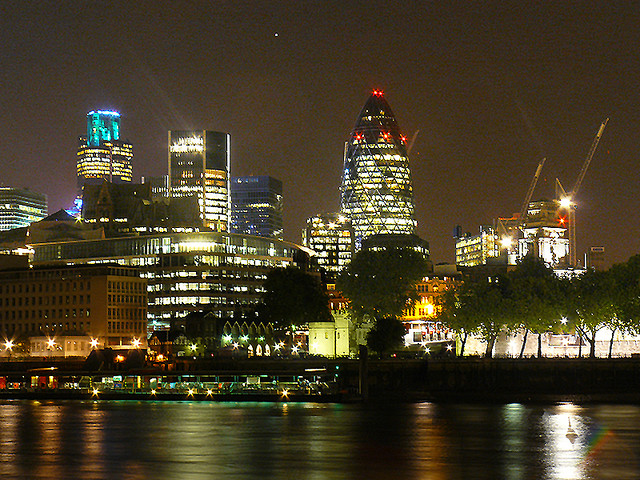For the good of society, we need a democratic reformation of finance

The City of London – heart of the UK’s financial services industry (Credit: Mike_fleming, CC BY SA)
Next month sees the seventh anniversary of the run on Northern Rock and six years since the collapse of Lehman Brothers, but what’s really changed? Banks ‘too big too fail’ still receive an implicit public subsidy worth £65 billion a year, a figure barely lower than before the financial crisis. Bonuses remain stratospheric, topping £13 billion in the financial sector last year. Finance remains distant from the real economy, too often pursuing ‘accumulation for accumulation’s sake’: at the end of last year, nearly 90% of the £2.4tn worth of loans outstanding to UK residents from banks went to fund either financial companies or property deals, with business lending flat lining.
A crisis that should have been used as a ‘provocation to rearrange the place of finance in our economic lives’ has instead then left the basic architecture of the financial system that caused the crash still largely in place. Of course, significant reforms have improved the financial ecology since, such as the new Basel III agreements on equity requirements, the creation of ‘living wills’ for major banks and a strengthened financial transaction tax. Moreover, the sector has itself shrunk slightly in size. Nonetheless, the key set of interlocking arrangements that give finance capitalism both its immense productive potential but also generate the problems which have so animated public debate since 2007-08, remain relatively untouched These include the unregulated privilege bestowed on banks to create and channel credit – what Ann Pettifor memorably terms the ‘power to create money out of thin air’ – and the exceptionally high levels of leverage they are allowed to operate with in a fractional banking system.
Complementing this is a corporate governance code that embeds systemically risky incentive practices and the near-unconstrained ability of the financial system to ratchet upwards private debt levels. These interlock to generate the enormous amounts of economic rent the sector captures:upwards of 50% of the income differential between the sector and the rest of the economy is accounted for by rent capture.
Within this context, debates over whether to have 45p or 50p top tax rate mistakes the wood for the trees. The larger, harder but more important question is how to reverse the process of ‘financialisation’, which generates the significant levels of rent and imbalances of economic power in the first place. We should focus on reasserting the democratic, public interest over the institutions that underpin the dynamic of financialisation.
What could this mean in practice? Firstly, we need a new policy of credit guidance to reanchor newly created credit in the real economy. Left to its own devices, our financial system generates far too much credit for financial trading and property deals and far too little for the non-financial economy. Guidance, managed by the Bank of England but guided by democratic mandate, would ensure that newly created credit would do exactly what theory presumes it should but doesn’t currently do enough of in practice: invest in capital formation that builds the productive capacity of our economy so that it is capable of generating higher sustainable returns. This should be supported by a more pluralistic, long-termist banking system, with a greater role for public banking, for example a British Investment Bank to finance long-term production and SMEs currently locked out of the lending market.
Secondly, crucial intermediaries and regulations shape the nature of the financial system. Reform should target these critical aspects. For example, a new European public option ratings agency, funded by a financial transaction tax, could help provide a clearer signal of value within the market. A Parliamentary Commission on the monetary system could better unveil the mechanics of how the dynamic of credit creation is crucial to the nature of economic growth and examine radical reforms, such as providing central banking services directly to anyone who wants them, not just the banks. Raising equity requirements, meanwhile, would reduce the implicit subsidy large banks continue to receive and lower the risk of financial instability.
Finally, tackling financialisation requires creation of genuine value. A new ‘British Future Fund’ should own assets and financial equity on behalf of the nation, investing the proceeds to meet the long-term needs of the country. Hypothecating certain financial operations, for example a scrip tax on bonuses or during mergers and acquisitions, would provide a strong, sustainable base for funding public investment, based on the public ownership of financial capital. In this way, social accumulation of the proceeds of financialisation can in time help to fund directly vital future public expenditure.
This represents an ambitious agenda. Ranged against the wealth and power of organised finance, such ambitions might seem remote. Yet a useful analogy can be drawn between today’s financial system and the Catholic Church on the eve of the Reformation; both were and are an imposing cultural, intellectual and social system, vastly powerful with claims to a totalising logic, whose elites spoke and operated in a vernacular beyond the understanding of ordinary people. As then though, so today the hierarchy imposed by excessive financialisation is shallower than imagined and deep-rooted change is still possible.
 Mathew Lawrence is Research Fellow at the think tank IPPR, whose new report, ‘Definancialisation: a democratic reformation of finance’ is published this week.
Mathew Lawrence is Research Fellow at the think tank IPPR, whose new report, ‘Definancialisation: a democratic reformation of finance’ is published this week.




 Democratic Audit's core funding is provided by the Joseph Rowntree Charitable Trust. Additional funding is provided by the London School of Economics.
Democratic Audit's core funding is provided by the Joseph Rowntree Charitable Trust. Additional funding is provided by the London School of Economics.
For the good of society, we need a democratic reformation of finance, argues Matthew Lawrence https://t.co/mjyLZK7I2n
For the good of society, we need a democratic reformation of finance https://t.co/YprousydXf
For the good of society, we need a democratic reformation of finance @ippr https://t.co/YKo9RV3DoT
For the good of society, we need a democratic reformation of finance https://t.co/Zixt59aE6U